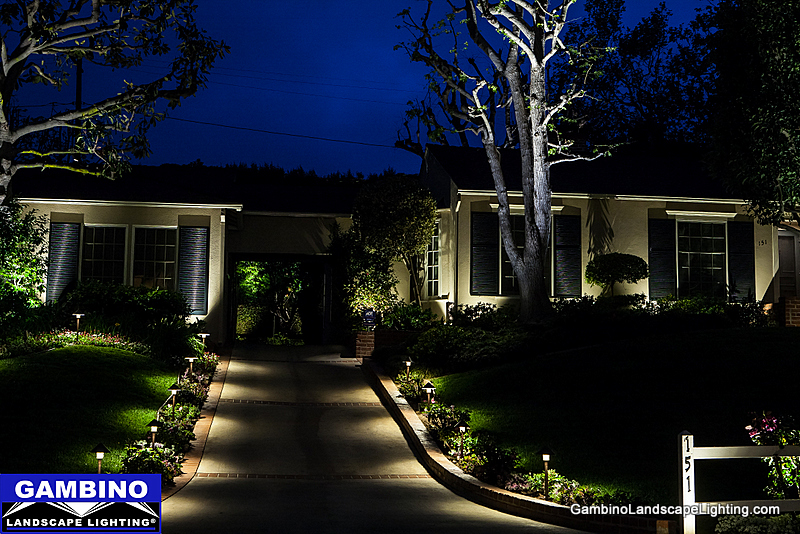19 Apr 20 things you must know to be successful in landscape lighting
By Mike Gambino
 Having success in the landscape lighting business means a lot more than just powering up some lights. This is a list of things you must know if you want to make it as a pro landscape lighter. Some of them are obvious, others may surprise you. No such list can guarantee success for anyone, however, you will have a better chance if you acquire this knowledge.
Having success in the landscape lighting business means a lot more than just powering up some lights. This is a list of things you must know if you want to make it as a pro landscape lighter. Some of them are obvious, others may surprise you. No such list can guarantee success for anyone, however, you will have a better chance if you acquire this knowledge.
1. Know what you want
You should have a clear idea of what kind of landscape lighting you want to specialize in. It is the sort of thing only time and practice reveals. You should also know if you want to be a full time professional and make an income, or if you want to perform at an advanced amateur level as a sideliner.
2. Know the technical aspects
Successful lighters have good knowledge of how their systems and equipment work. Make sure you know everything there is to know about landscape lighting systems. As long as you understand the principles they work by, you’ll be able to install any kind of fixture.
3. Know the history of photography
Every lighter should know who F.B. Nightingale and Bill Locklin were. Study the great masters of landscape lighting, study their work and how they operated. A clear view and appreciation of the past is essential for any developing artist.
4. Know the greats of today
Never before have there been so many landscape lighters in the world, and thankfully, there are some incredible talents in our times. Finding them is easy in today’s web age so make sure you study their work. Understanding how a lighter created a certain effect can make a huge impact in the way you work and develop your portfolio.
5. Know the tools you need
It is a fast changing industry and the equipment is getting more and more advanced and more and more tempting. However, being successful starts early. You should know exactly where to put your money and buy the best of what you need within your means. Spending a fortune on a truck or tools will make you feel good the first few days, but if you sacrificed buying multi meters or marketing budget dollars you could have used for business, it might not pay off.
6. Know how to light like others
In no way am I encouraging you to copy anyone’s work but I do think you should try reproducing other’s signature style from time to time. Why? Because this will give you the confidence that you have what it takes to deliver a professional result and, more important, it will make you find your own style. Only by being able to do someone else’s work can you truly see the importance of making your own work unique .
7. Know how to keep the passion going
Your life as a professional landscape lighter should be based on making an income by doing something you love , yet there are times when the fire that used to drive us is in jeopardy. Dealing with many clients, meeting many demands and working long hours will take a definite toll on your passion for landscape lighting. You need to find a way of getting it back and making sure you aren’t in danger of losing it for good. Unfortunately, there isn’t a universal way of doing this and it’s up to everyone to find out what works best for them. I get away for the weekend (although this doesn’t happen very often), read lighting or business books by the masters but everyone should do whatever rejuvenates there passion.
8. Know when to say no
Since you are providing a service, there might be times when people will ask you for favors. Many folks often make the mistake of believing our job is an easy one, that all it involves is putting a few lights in, and so on. Therefore, you should be able to make exceptions from time to time and not charge anything, right? Wrong! Unless it is really close family , you shouldn’t be giving your abilities for free to anyone, not even to your brother’s best friends or your grandma’s neighbor. There are people who find it difficult to say no to someone when they are being asked politely. However, in the long run , these favors will harm your business rather than help it grow. Learn when and how to say no, and do it in the most polite and professional way.
9. Know how to negotiate
A vital part of any business is the ability to close the deal, so to speak. Negotiations can be very scary, especially for creative, artistic people who would rather have the money talk done for them. Sadly, not everyone is at the level where they are represented by a sales agent who does the negotiating, thus relieving them of this burden. So you need to know how to do it on your own. I strongly advise seeking help in other fields of work. I’ve heard people who work in sales are particularly good at this.
10. Know how to lose a deal
Especially if you live and work in a smaller community. Regardless of location, every now and then things don’t work out the way you want them to. A potentially rewarding contract could go to someone else. Learn to accept it and move on. Do not call for a re-offer, do not threaten the competition into backing out of the deal, do not ask the client what deal they went for and so on. The fish in the sea saying applies here. Pick yourself up with dignity and go find new opportunities, new clients.
11. Know how to play to your strengths
This means picking the best effects from projects and adding them to your repertoire. You should know how to position your fixtures consistently job after job to be show your work without guesswork or uncertainty. Having the ability to put forth your best work each and every opportunity will have a significant impact on your professional future. After all, you may light whatever you want or whatever the client asks of you, but at the end of the day, it matters what you show the world.
12. Know how to present yourself
It helps if the client sees you as a professional. Other than the way you work, the way you look plays an important part. I’m not saying go to work in a suit and tie, just make sure you look tidy and wear color appropriate logoed apparel that supports your brand.
13. Know your competition
Do your best to figure out what the other local pros are doing, especially the successful ones. Observe their work, their business model and marketing and learn from them. DO NOT copy anything. Instead, adapt in such a way as to stand out from the crowd and offer a different, better option.
14. Know how to master light
Do your best to reach a level where you are fully capable of mastering both shadow and artificial light, as well as combinations of the two. Light is the core of your work. Knowing its secrets will separate you from many competing lighter and will establish you as THE pro to work with.
 15. Know how to market yourself
15. Know how to market yourself
Vital in any business. Also another thing many creative people dislike because it makes them feel like used cars salesmen , regardless of how talented they are. If you’re serious about getting anywhere, marketing your business is not optional. It’s not rocket science, it’s just a different way of working with people. Again, seek advice from different fields. People who work in marketing, communication, PR and successful similar businesses can provide helpful knowledge in this area.
16. Know how to blog
Writing can be very helpful to a lighter. It’s a new, different way of channeling creativity but it can also help you escape a creative rut.
Blogging can bring in new fans as well as clients. Try to write interesting posts about your work or future projects and learn how to use SEO to your advantage.
17. Know how to appreciate art
Great inspiration can be drawn to lighting from other art forms. You shouldn’t limit your interests to garden lighting. A good landscape lighter is, above all, a well educated person. Go to museums and art galleries and explore what some history’s greatest artists have to offer. It will help you keep an open mind and it will help your vision evolve.
18. Know how to make your clients feel special
This will take you a long way, possibly further than your landscape lighting skills. It doesn’t mean you should be a lousy lighter, but good communication skills will bring you a lot more work than you would expect. If you can make them feel good while working with you, you’ll most likely be getting more work from them or through their recommendations.
19. Know how to price your work
You are providing a service based on your talent and that has a cost. You have to clearly determine that cost by taking into account things like taxes, expenses, truck and tool investments, shop rent, number of available hours to work in a day , number of working days in a year ,etc. Pricing is a lot more rational than it seems at first glance. You can’t just invent a fee depending on the client. I mean you can, but it won’t get you to far. It’s all part of the business plan so make sure to include this in top priorities.
20. Know how to keep going
Being a lighter is not an easy way to make a living , though it can be a very fun and rewarding one. Everyone starting a business faces an inevitable risk of failure. It’s up to you to prevent that from happening. If you learn from other people’s mistakes and maybe even take advice from lists like this one, you will have a pretty good chance of keeping things going and growing. There will also be times when you will want to throw it all away and go back to whatever it was you were doing before you picked up a lighting fixture. Don’t. It’s a long, hard road to walk but if the joy overcomes the heartache , even by a small margin, keep going.
This landscape lighting blog is published by Mike Gambino of Gambino landscape lighting inc. all rights reserved. Mike is a professional landscape lighting system designer/ builder and has been designing, installing and maintaining landscape lighting systems for more than 20 years. Mike resides in the Los Angeles area with his wife and 2 sons. To visit his website go to www.gambinolighting.com . To inquire about hiring Mike please click here .
Blog articles may be published with permission on other websites without editing or removing links.



Keith Rosser
Posted at 20:59h, 25 AprilMike, Thanks for the inspiration! Glad to know others in the industry care so much about the craft and art form. Also that they care enough about others in the industry to provide such keen insite!
Mike Gambino
Posted at 22:55h, 25 AprilThanks Kieth for reading and commenting.